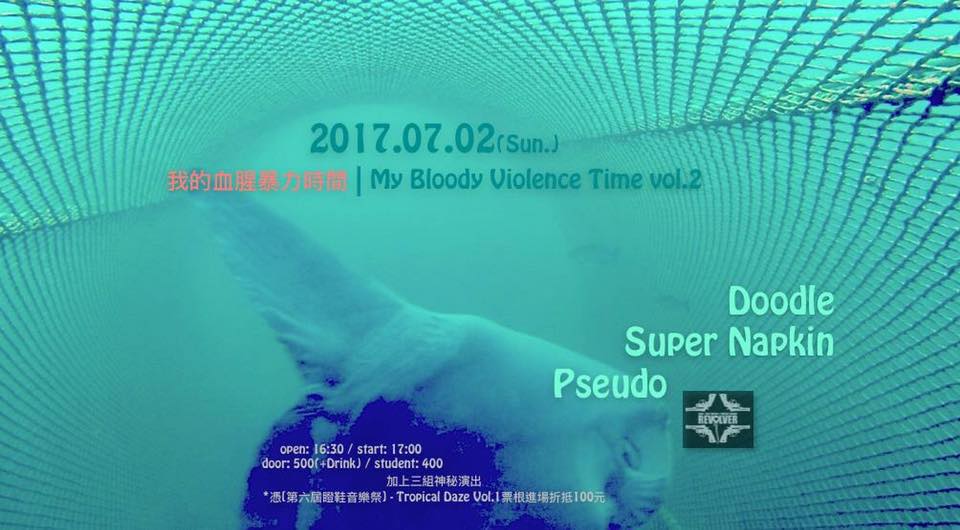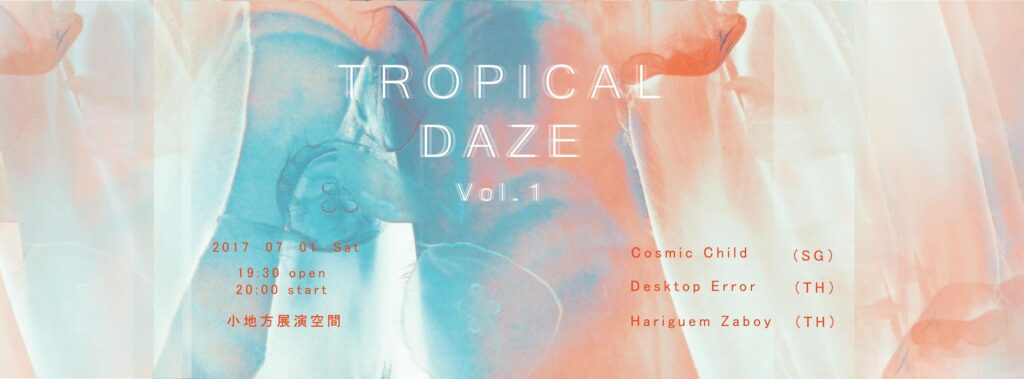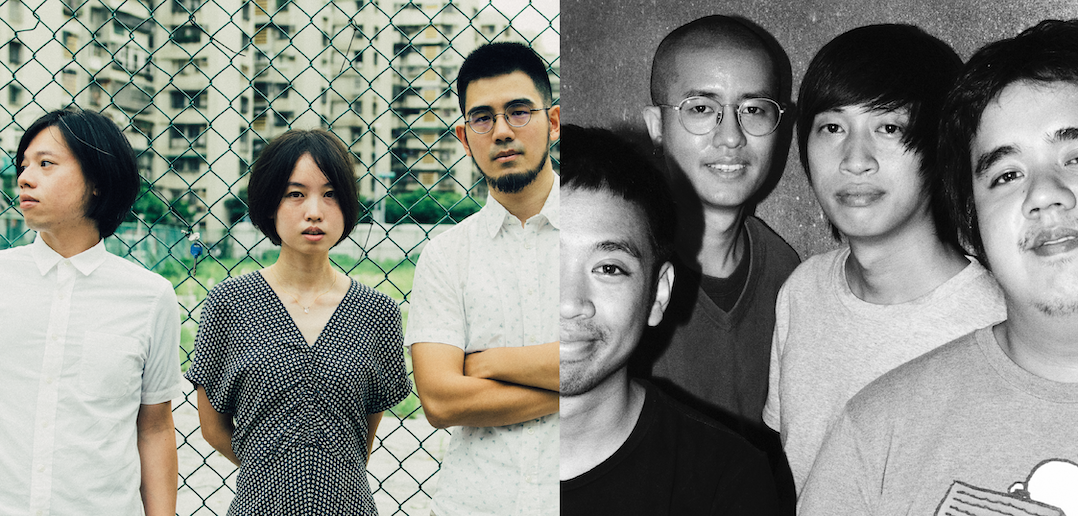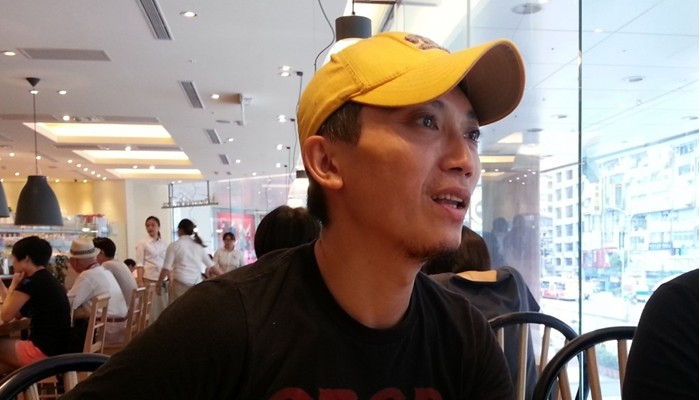If you've ever been in a band, especially one that tours, you know that music can make for fast friendships. Bonds are formed quickly during long hours in a van, in early-morning, bleary-eyed lobby calls, and in storming from city to city, town to town, playing to crowds large and small, rabid or indifferent.
When musicians who've never met before come together for the first time, even if they come from different countries and cultures, they always have that all-important filter—the one that lets each other know if they're going to become lifelong brothers and sisters of the sonic cloth or if theirs will be little more than a nodding acquaintance, "Nice set, bro," kind of relationship.
That filter often goes something like this: "What do you think of Dinosaur Jr.?" Answer correctly, and the bond is forged. Answer incorrectly, and... nice set, bro.
Taiwan's Super Napkin and Thailand's Hariguem Zaboy, two bands simultaneously at the forefront of the East Asian fuzz, shoegaze and indie rock scenes, went through those awkward first moments, applied the filter, and found in each other a kindred spirit.
Taiwan Beats posed a few questions to reps from both groups, Super Napkin guitarist Yau and HZ's own six-stringer Rungsimun Suwiruttanapast, to find out about each of their musical journeys, how they managed to cross paths, and where those paths might lead them next when we eventually, hopefully, transition to a post-pandemic world when bands can once again stalk the earth.
First things first. How do your two bands know each other?
HZ: After the release of Kart, we went to play two shows in Taipei. We met in the second show at Revolver, which was a super great show. We chatted backstage about how great it was. We still keep in touch.
SN: It was hot when we first met. We caught Hariguem Zaboy when they were invited to play in Taiwan during the summer of 2017. There were two shoegaze music events in a row over that weekend, Tropical Daze Vol.1, held by Shoegazemania and Bear Igloo Records, and My Bloody Violence Time vol.2, by Revolver. Hariguem Zaboy (TH), Desktop Error (TH), and Cosmic Child (SG) were the headliners, and some shoegaze bands from Taiwan joined the second day event, including Super Napkin. I was swinging my head way more than staring at my Vans when Hariguem Zaboy was on stage, and my gut was telling me these are my people -- having the 'shoegazer' tag on the back of the shirt but in reality only listening to My Bloody Valentine and having a huge collection of 80's and 90's lofi/no-wave/alternative records next to the piles of Japanese comic books, and probably has Winona Ryder's poster hanging on the wall. We had a bit of chat after the gig and hooked up again via Facebook. Our mutual love toward bands like Yo La Tengo, Chris Knox, Eric's Trip, and many others made my pick-up lines pretty successful.


Each band has an interesting dynamic. In Hariguem Zaboy, the members are longtime friends since high school. Super Napkin features a married couple, with the drummer playing third wheel. How do these personal dynamics play into each of your creative processes?
HZ: I think it helps us to share the same direction of interested things. Always look at the same spot and easy to talk. I think it helps us in the studio and writing processes more than on the stage.
SN: We do the traditional band-member-introduction thing pretty religiously on stage, because I have to tell the audience that Weiting, the lady who's playing the bass, is actually our accountant (on her way to becoming the COO). I'm too concentrated on knob-tweaking, so the real work of the band operation are mostly done by her, whose favorite music genre is Microsoft Excel. Plus, it's extremely difficult to find a bassist who enjoys playing the same note for more than 10 minutes, so I had to marry her.
Shih, on the other hand, is the philosopher of the band behind the drum racks, as with most of the best bands out there. Whenever we replace the communications with arguments, he's the guy who puts everything back to a logical discussion. Also, he doesn't complain when I say something like 'I want less humidity but more Irish Hip Hop in da beats.' I've heard people's jaws got dislocated by drumsticks when they do that to their drummers from time to time.
Musically, your two groups do share some common ground, which I'm sure critics could dissect and expound upon for days. But I'm curious to hear in your own words what you feel that common ground might be, in terms of lyrical themes, or purely the music itself.
HZ: Yo La Tengo, Sonic Youth, Dinosaur Jr. and Eric's Trip are the common space we have. Think that we both share some melodies of vocals and noise guitar parts from Yo La Tengo obviously. Sonic Youth is the main influence on why HZ loves abstract lyrics while Super Napkin has had the sweetest ones from YLT and Dinosaur Jr. They are never afraid of writing super long songs just like YLT. And we both love punk attitude and lo-fi power from Eric's Trip which you will see in HZ new album.
SN: I want to say the swag, but honestly, it's the geekiness. I feel both of us don't want to sound like our favorite bands, but rather to explore the sound and musical ideas as they did back in the 80's and 90's. I don't personally know the story of Hariguem Zaboy's teen years, but I'm pretty certain we were very similar when it comes to getting to know bands like Pixies, Pavement, The Cure, My Bloody Valentine, etc. early in life, trying any possible way to discover interesting bands in the same vein, devouring every second of the music to grow each ounce of our identity from it, and sometimes, in the middle of the night, singing 'Why Can't I Be You' to ourselves with tears in the eyes. The last bit is probably just me.
I'm wondering, for each band, is acceptance outside of your home countries something that's important to you as an artist?
HZ: I think the music from HZ and SN is never like the things from Taiwan or Thailand. We mostly (more than 95%) have the influences from American and European music. We rarely listen to music from our own country to be honest. HZ never liked to be a Thai band. We always want and look at ourselves as an international band, as our only goals are to release some albums in the states or Europe and have great tours there. We don't care if we can do that in the age of 40-50 years old. We just need to do it. Do music, release the album and have a tour.
SN: Don't quote me on this, but I remember Stuart Braithwaite from Mogwai once said something along the lines of 'In a better world, Low would be the most popular band on earth.' It could be from someone else but this idea has stuck with me forever because it pictures a parallel universe where our music could probably be on a wedding playlist and nobody would complain about it.
On the other hand, we don't really make music for weddings, so it's ok to us that in this reality we indulge ourselves in making the 'pop music' we would like to catch on the radio. Considering how niche the target audience is, it always feels like a small miracle to find someone else is connected to our music, especially when playing live. In that sense, locally or internationally, we'd like to have more opportunities to experience that.
Both of your bands sing either entirely or mostly in English. Was this with a mind toward breaking out internationally, or was there some other rationale behind it?
HZ: For me it's easier to write English lyrics with the melodies I need. It's more adaptive in terms of how we pronounce the words. Thai language always sticks to the intonations which don't give me enough freedom to enjoy with melodies. And yes, international issues matter to us as well.
SN: It's more or less a necessity due to the way we write music. After recording the first album, it became obvious to us that the tracks we figure out together from the ground up in the rehearsal space are way more interesting than the ones I wrote and brought to practice. From that point on, we've spent most of the time just playing together to build each song upon a simple idea, letting it construct and destruct multiple times, until we feel it tells a complete story. Vocals are mostly a vehicle to add sounds in certain sections to push the song forward, and the lyrics are often done in the last minutes whenever we decide to play a new track live for the first time, or just before we start tracking the vocals in the studio. By nature, English is easier to transform my meaningless mumbling into something that seemingly makes sense.
There's a heaviness to both band's sounds. Super Napkin, on your latest album, There's Nothing That Cannot Beat Me, the heavy really comes out on "Nothing's Wrong It's Always Wrong." And for Hariguem Zaboy, it seems like the heaviness is always lurking there, threatening to come out from with the jangled, noisy riffage. Where does that heaviness come from, for each of you?
HZ: We always love the underground spirit. That's why punk music always hit our mind. Late 70's to early 90's is the era which mostly shape us as musicians. We smell the Rat pedal and Big Muff in our entire youth years until now and never got rid of it.
SN: From our day jobs. Besides, I'm addicted to distortion.
Both bands come from countries that seem to have a strong post-rock, indie, noise rock kind of scenes, or at least where there are quite a few kick-ass bands that fall under those banners. What do you think it is about each of your cities (Bangkok and Taipei) that has managed to forge these kinds of bands, playing these particular styles of music?
HZ: This is what we need to know as well! In our opinion, maybe because legendary Thai bands like Moderndog went to do an album based on the post-rock and noise sound in 2000s era which was new to the listeners in Thailand that time. Goose, another Thai band, followed up with a good album. It moved most teenagers in that era to another space which they never went to (Before that Thai Indie scene is always about pop music with the funk rhythms). The main radio station started to play their experimental songs on the radio. That's the start of it, I think. But it's obviously not the same way we started to love noise music.
SN: Not unlike the other parts of the world, it's out of the urge to find a way to express oneself, identifying with the ideas and art forms that are not fed by the mainstream culture and media, and making a statement instead of following the narration. After martial law was abolished in Taiwan in the late 80's, more music, books, and films that speak to the teen angst from the West and Japan became accessible, and the following generations of teenagers have internalized them and created their own.
Post-rock and fuzz, or noise rock that comes from place like North America or Europe gets a lot of love. But it seems like the world at large has yet to catch on to those scenes emerging in Asia. Why do you think that is?
HZ: They are original, so it doesn't surprise me that they have overlooked this kind of music in the region of the world, 'cause they can find the same from next door. But the world is changing. It's gonna get better and better for noise lover musicians in Asia to get attention from the world as through the internet music and culture spread out so fast nowadays. Boredom is the pioneer from Japan and Asia. And Sonic Youth used to be interested in Chinese bands like Carsick Cars and have a toured together in the states. So it’s not that bad, in our opinion.
SN: When it comes to this topic, it's hard not to mention Japanese music. Japanese alternative artists from bands like Boris, Cornelius, Bloodthirsty Butchers, to the legends such as YMO, Keiji Haino, or even Yoko Ono, have gained attention and huge follower-base from the Western world throughout the years. Aside from having far more presence globally as a country, the history of the modern Japanese music development is also much longer than the nearby countries, plus the pop cultural products from Japan, like video games and anime, have been exported to and favored by generations of teenagers in the West already, resulting in a well-accepted 'exoticness' and a general interest toward the MIJ 'products.' Even with all these advantages, still only the most unique bands from Japan have a slight chance to make a name in the Western scene. I think that says something about Asian bands gaining exposure in the West.
On the other hand, here in Asia, I think it's safe to say that the ratio of population digs deep into Western alternative music is much higher than the Westerner into the music from the East, but it's still a very niche circle nonetheless. I don't expect the audience in the West to look further when there is already great music all over the place there, but we do have something they don't have.
Covid-19 seems to have much of the musical world in a holding pattern right now. It just so happens, though, that both Hariguem Zaboy and Super Napkin are from countries where it's currently safe to hold gigs and even tour around domestically. So for each of you, what are your plans for the rest of 2020?
HZ: It's a bit harder for Thai people, because we have been having a supervillain government and our political side is shit for almost seven years. They still never let us to play any gigs until now even if we don't have covid-19 in our country for more than 100 days already. So, our main plans in 2020 are to release this 3rd album, which is called 'John Young Sandwich', trying to spread this album all over Asia and some place in Europe as much as we can, and having great tours in Thailand for the last three to four months of the year. That's good enough for us.
SN: We all feel blessed to play gigs and make music as in the 'old normal,' when the world is already preparing for a 'new normal.' Our latest album 'There's Nothing That Cannot Beat Me' which just came out this summer is our best received release so far, and people seemed to enjoy the release party a lot with the addition of VJ and lighting. The 'on-hold' period of COVID early this year did allow us to slow down and prepare for the show much longer when the future was uncertain. That being said, we are far from mainstream even in the alternative music scene in Taiwan, where chiller and slower music are thriving at the moment. Therefore, the plan would probably be keeping our day jobs while breaking even with the cost of this release, so that we can get more materials we've been working on released in the near future.
And finally, to spread a bit more love for the scenes in your respective countries, what three bands would you each recommend everyone check out?
HZ: Summer Dress, Desktop Error, and Dogwhine
SN:
Deca joins. It's the sound that this generation of Taiwanese youth are into, and they are still evolving into something bigger.
TOUMING MAGAZINE/Vooid. Hom Shenhao, the mastermind behind these two bands, is one of the most significant DIY/Punk icons in the Taiwan alternative music scene. He happens to be a great singer-songwriter.
Valley Hi!: If you like Neu!, you have great taste, and you will appreciate Valley Hi! for sure.
*This interview has been edited and condensed.


